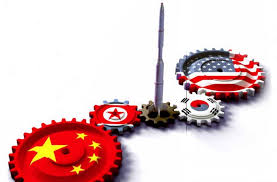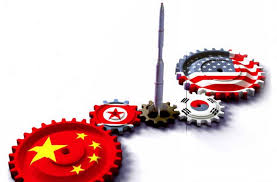
According to experts, trade tensions between the United States and China would badly hurt Asian economies such as Taiwan, South Korea and others in South East Asia.
Gareth Leather, senior Asia economist at Capital Economics noted that a very significant amount of "intermediate goods" are exported into China by these countries which are then assembled there and then the finished products are exported to other western countries such as the U.S.
Semiconductor chips and screens are examples of "intermediate goods". Typically, there are a number of production locations of these intermediary goods in Asia. The goods are sent to China as component parts where they are assembled into finished products such as mobile phones and computers.
Multiple threats of imposing tariffs have been issued by both China and the U.S. targeting each other’s goods. According to a note by analysts at JP Morgan, electronic products are likely be part of the final list of goods that are to be tariffed even though the lists is yet to be finalized.
There would ultimately be a drop in Chinese exports to the U.S. if the proposed and planned tariffs by the Trump administration are imposed on Chinese products. In that eventuality, the exports of the intermediate goods from the various Asian economies would also suffer.
"By its very nature, such products are highly reliant on tightly integrated supply chains. To that extent, this would propagate any trade shock into the region," the J.P. Morgan analysts said.
This threat of drop in business is being faced by multiple emerging economies amidst an environment when those economies are feeling the pinch of capital outflows and a drop in the value of their currencies.
By the middle of this week, there was a 1.7 per cent drop in the Taiwanese dollar since the beginning of the year to touch 30.172 per U.S. dollar. In the same period, a 4.2 per cent drop in the Korean won was seen compared to the U.S. dollar at 1,110.89 per U.S. dollar.
There also has been a drop of 1.5 per cent in the value of Singapore’s currency in the same period to touch 1.3567 per U.S. dollar while a smaller 0.6 per cent drop in value was noted in the Thai bhat to touch 32.73 per U.S. dollar in the same period.
Top of Form
After the escalation of trade tensions between the largest two economies of the world, those above-mentioned currencies hit their weakest levels in seven months against the dollar.
But experts said that till such time that the actual list of goods that are to be face the tariffs are made public, it would be not possible to calculate the actual impact on the economies of these Asian countries. Leather said that because China is the dominant supplier of many goods that it sells to the U.S., the actual impact of the tariffs could in fact be lesser than expected.
"U.S. consumers would struggle to find sufficient substitutes to replace the goods that they currently buy from China, at least in the short-term. What's more, to the degree that other countries can step in, Asian exporters are well-placed to benefit from any shift in U.S. demand," he said.
"Until we know exactly which goods are targeted, it will be impossible to calculate the impact on the rest of Asia," he added.
(Source:ww.cnbc.com)
Gareth Leather, senior Asia economist at Capital Economics noted that a very significant amount of "intermediate goods" are exported into China by these countries which are then assembled there and then the finished products are exported to other western countries such as the U.S.
Semiconductor chips and screens are examples of "intermediate goods". Typically, there are a number of production locations of these intermediary goods in Asia. The goods are sent to China as component parts where they are assembled into finished products such as mobile phones and computers.
Multiple threats of imposing tariffs have been issued by both China and the U.S. targeting each other’s goods. According to a note by analysts at JP Morgan, electronic products are likely be part of the final list of goods that are to be tariffed even though the lists is yet to be finalized.
There would ultimately be a drop in Chinese exports to the U.S. if the proposed and planned tariffs by the Trump administration are imposed on Chinese products. In that eventuality, the exports of the intermediate goods from the various Asian economies would also suffer.
"By its very nature, such products are highly reliant on tightly integrated supply chains. To that extent, this would propagate any trade shock into the region," the J.P. Morgan analysts said.
This threat of drop in business is being faced by multiple emerging economies amidst an environment when those economies are feeling the pinch of capital outflows and a drop in the value of their currencies.
By the middle of this week, there was a 1.7 per cent drop in the Taiwanese dollar since the beginning of the year to touch 30.172 per U.S. dollar. In the same period, a 4.2 per cent drop in the Korean won was seen compared to the U.S. dollar at 1,110.89 per U.S. dollar.
There also has been a drop of 1.5 per cent in the value of Singapore’s currency in the same period to touch 1.3567 per U.S. dollar while a smaller 0.6 per cent drop in value was noted in the Thai bhat to touch 32.73 per U.S. dollar in the same period.
Top of Form
After the escalation of trade tensions between the largest two economies of the world, those above-mentioned currencies hit their weakest levels in seven months against the dollar.
But experts said that till such time that the actual list of goods that are to be face the tariffs are made public, it would be not possible to calculate the actual impact on the economies of these Asian countries. Leather said that because China is the dominant supplier of many goods that it sells to the U.S., the actual impact of the tariffs could in fact be lesser than expected.
"U.S. consumers would struggle to find sufficient substitutes to replace the goods that they currently buy from China, at least in the short-term. What's more, to the degree that other countries can step in, Asian exporters are well-placed to benefit from any shift in U.S. demand," he said.
"Until we know exactly which goods are targeted, it will be impossible to calculate the impact on the rest of Asia," he added.
(Source:ww.cnbc.com)





